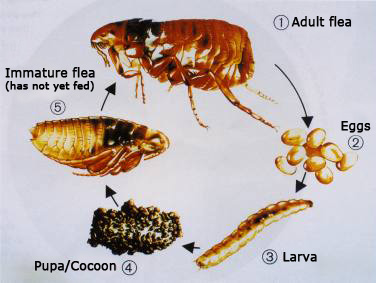 The following is simply some basic information about common pests in the home. If you have a pest emergency or any additional questions, call us or email This email address is being protected from spambots. You need JavaScript enabled to view it..
The following is simply some basic information about common pests in the home. If you have a pest emergency or any additional questions, call us or email This email address is being protected from spambots. You need JavaScript enabled to view it..
- A female flea lies between 300 and 800 eggs in her lifetime.
- The flea larvae hatch from their eggs after 1 to 12 days, living near the areas where your pets lie.
- It takes from 7 to 15 days–or even several months–for the larvae (worm like) to form cocoons and pupate.
- Adult fleas take anywhere from a week to several months to emerge from their cocoons, depending on environmental conditions, i.e. heat, humidity, and the amount of activity (or sense of host) present.
- If fleas in pupate (cocoons) do not sense a blood host (activity), they can remain dormant in their cocoons for up to a year. This is why you need to vacuum. The vacuum creates vibrations that the flea in the cocoon senses and stimulates the flea to emerge.
- The adult fleas you see in your home make up only approximately 2% of the total population.
Home Flea Invasions
Approximately 80% of the fleas in your home are in the egg and larvae stages. Growth inhibitors or insect growth regulators (any of which is commonly known as an Insect Growth Regulators – IGR) are products or materials that interrupt or inhibit the life cycle of a pest. Many people loosely use the term “birth control for fleas.” If an animal cannot reach adulthood, it is not capable of reproducing. By inhibiting the maturity of an insect, we keep it from reaching the critical adult stage, thus stopping the life cycle and infestation. In layman’s terminology, an IGR is not an insecticide (in the bug killing definition) but is a man-made protein that only affects certain insects or groups of insects. Flea eggs and flea larvae that are exposed to an IGR will never develop into the adult jumping, biting, and (most important!) reproducing fleas.

How Fleas Hurt Our Pets
- The main problem is obviously irritation. This is often variable between animals because some dogs and cats become allergic to the flea saliva, while others tolerate lots of fleas quite happily.
- 72 fleas can consume 1ml of blood per day, so severe infestations on very small animals, cat_flea_dirtsespecially puppies and kittens, can cause severe anaemia and even death – hard to believe but it does happen every year.
- Fleas also carry a tapeworm, Dipylidium caninum, which is ingested when a host animal grooms a flea off itself. IF YOUR PET HAS FLEAS, IT WILL HAVE WORMS AS WELL.
- Finally fleas can bite humans – they prefer our fur-covered friends, but if you have a bad infestation in your house they will attack your ankles and calves, or come at you from your sofa, biting your back.
Check out our other flea services, or contact us for a quote today.
Learn More
CAUTION: Do not kill fleas by squeezing them. They can carry parasites and diseases.
Call with any questions. We are here to help!

